 | « Back to article | Print this article |
Not everything the devotees consigned to the sea on Monday at the end of the 11-day Ganpati festival is retained, a lot of it is in fact comes washing up in the tide. Paloma Sharma/Rediff.com speaks to the volunteers involved in the clean-up.
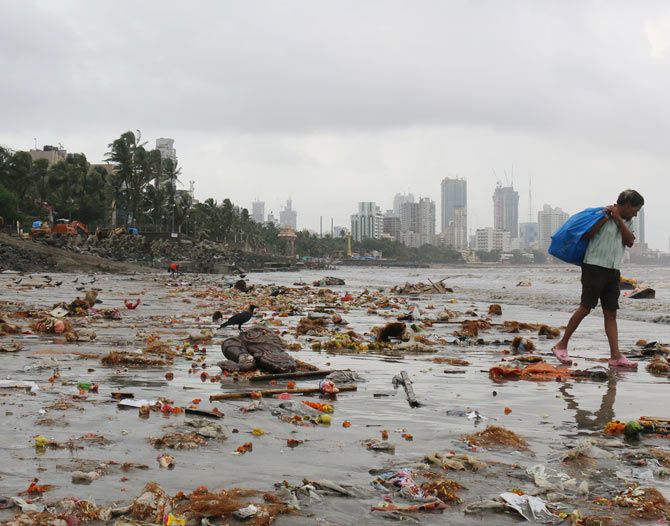
Fifteen-year-old Kavya Panavalasa looks satisfied with her efforts as she dusts the sand off her neatly ironed red tee shirt. "We've been here since morning," she says.
Kavya, a student of Vibgyor's Class X, is one of the bus loads of students helping the Brinhanmumbai Municipal Corporation clean up Mumbai's Juhu Beach after the final Ganesh visarjan (immersion) has been performed.
"We left from school at 6.30 am and have been here since then," she says.
This is Kavya's first time helping out with the cleanliness drive. "We do this every year but only the Grade 10s come here," she says.
Kavya (below) and her fellow students are quick to rush into the yellow school bus that comes to a screeching halt in front of the line of waiting students. As soon as it does, the orderly queue turns into a mob. "Aye last seat pakad! Last seat pakad! (Hey! Get the last seat!)," a boy yells and the struggle for cool-dom becomes clear.
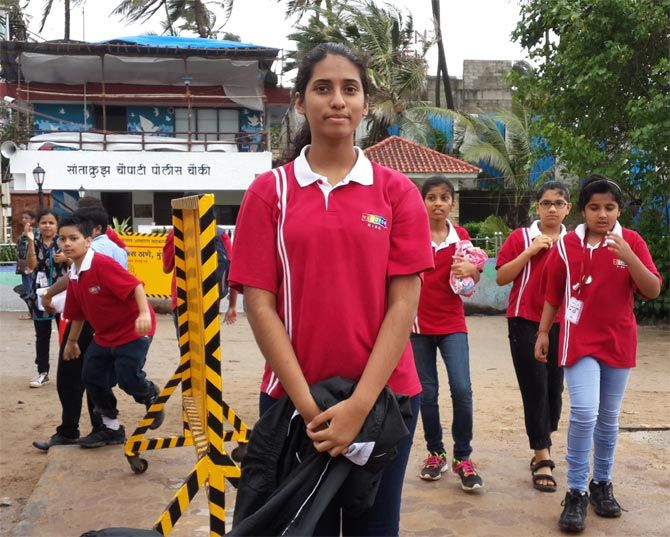
However, on the beach that they've left behind, the tide is rising.
The beach, which at 8.30 am had been almost spick and span, now has the sea's refuse deposited here and there by 9 am.
As the volunteers pick, drag and dispose of what is lying around, the sea throws up even more.
In their bright neon orange jackets, two life guards from the National Disaster Reaction Force patrol the beach. Their eyes are trained on a group of boys in black shorts who frolic in the sea, seemingly unmindful of what it spews out continuously.
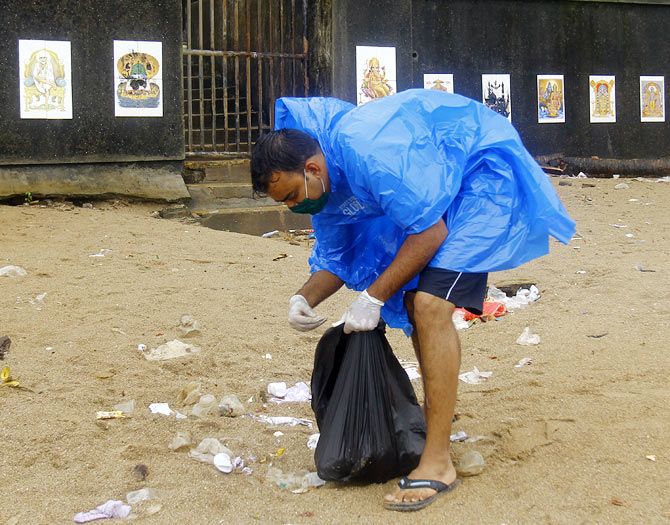
Lakshmi Shenoy, a corporate volunteer, and her colleague, along with the rest of their group, are bank employees who are part of an independent social outreach programme that is not associated with any non-government organisation.
Since it is their first year, the experience of seeing the beach thus comes as a shock.
"We are not here to hurt anyone's feelings," says Jayanti Shukla, executive director, United Way, mindful of the sentiments with which devotees performed the ritual less than eight hours ago. "The flower and biodegradable waste become organic manure. And we do whatever we're doing with great respect. We are not out to hurt anybody's religious sentiments."
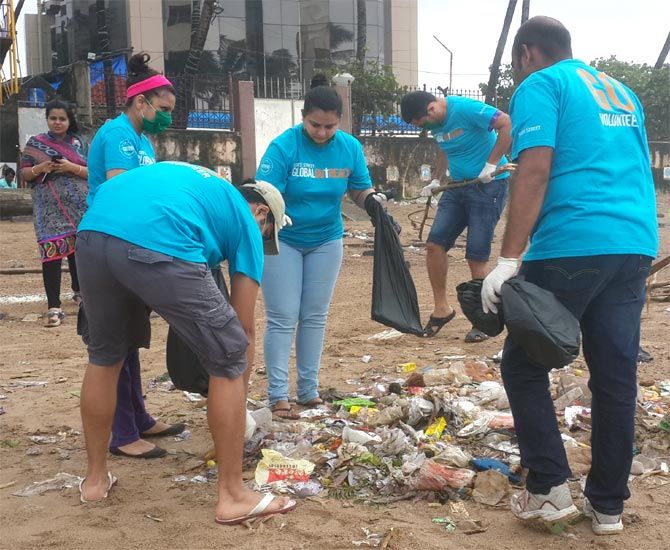
Jayanti adds, "We've been conducting this clean-up drive for the past six years. Since it is a voluntary effort, many students and corporates join us. This year, college students from across some 20 colleges and additional students from the National Cadet Corps pitched in.
"We are working with the municipal corporation, so we let schools, colleges and corporate volunteers know the clean-up is going to take place. In addition, we have 400 people of our own. Citizens with no affiliations also drop in to help independently."
Jayanti's organisation and the BMC equip volunteers with gloves and rakes, dividing them into groups and distributing them all over the beach.
"We got here at 6.30 am and, because it was high tide then, the beach was covered," she sighs. "People come here carrying everything in plastic bags. We actually had a campaign yesterday where we went from one group of devotees to another and collected the flowers right there on the beach. As a result, the flower waste is quite less today."
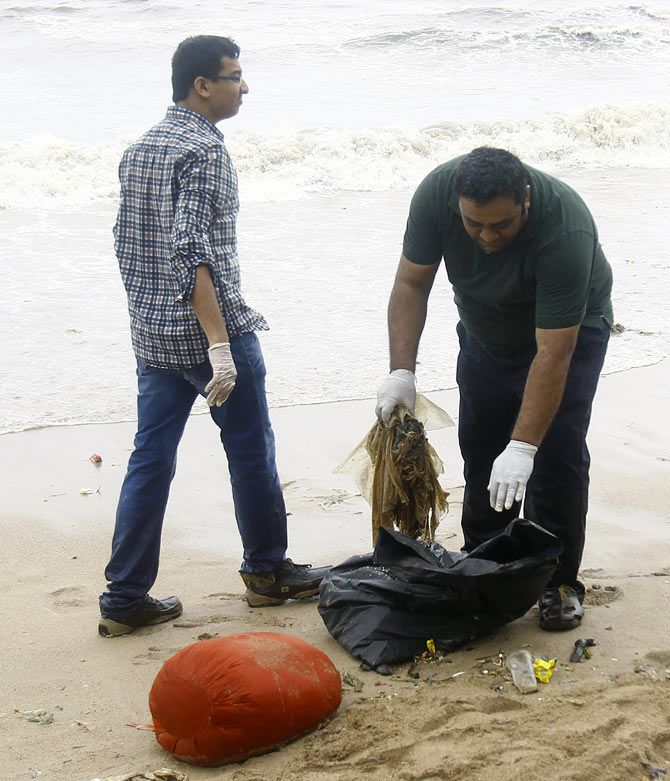
Jayanti feels that, in order to prevent a repeat from taking place next year, the size of the idols needs to be decreased and the material used to make them needs to change. However, she acknowledges it will take more than a year for this change to take place.
Nevertheless, she is optimistic. "To a large extent, people who keep smaller Ganpatis have started shifting to eco-friendly clay idols. For the larger ones to become eco-friendly, I think it will take some time."
This is only the first phase of the clean-up and Jayanti's work is certainly not over. "For a day or two, all this will keep coming out," she points to the line of plastic, flowers and miscellaneous decorations that draw an outline on the soft, grey-silver sand, showing the reach of the wave that washed them up.
Jayanti's organisation plays a big part in the cleanliness drive on the first day, the volunteers probably won't return after this. "But," she reassures, "in case there's too much of things to clean up, we will bring in the volunteers again."
DON'T MISS!
Day 1: Ganpati Bappa Morya! Bringing the Lord home
Day 2: Mumbaicha Raja and a sea of devotees
Day 3: Goodbye Ganesha… it's not easy to let You go
Day 4: The Ganeshotsav festival's biggest tragedy!
Day 5: 'It was pure love for the Lord'
Day 6: Why Mumbai visarjans are so orderly
Day 7: This Ganpati is edible, so nothing goes waste
Day 8: Mangala Gauri: The 'Women's Only' Festival
Day 9: Band, Baaja, Bappa: It's a grand farewell party
Day 10: 'We can go hungry, but bringing Ganesha home is mandatory'